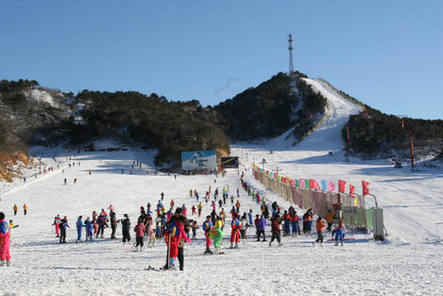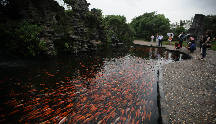New Year Fun in Miyun
New Year Fun in Miyun
At the end of 2010, Miyun County, on the northeastern skirts of Beijing, launched a holiday promotion ''Happy Warm Journey to Minyun,'' beckoning merrymakers to join the locals for the Chinese New Year. Highlighting the region's rustic vibe, observance of old traditions and customs, and mature tourism facilities and services, the event projects itself as great way to have fun and invite blessings for visitors and their families.
 |
|
Yunfoshan Skiing Area runs training courses for rookies and contests for old hands. |
Gifts and Premiums
Puzhao Temple: A variety of prayer ceremonies are staged in the Puzhao Temple during the two-week holiday season from Spring Festival Eve (February 2, 2011) to the Lantern Festival (February 17). Every visitor can receive a traditional New Year picture with the Chinese character for fortune, a goodwill gesture from the host to the guests to bring their blessings home.
Chestnut Tryout: Also from the Spring Festival Eve to the Lantern Festival free roasted chestnuts from a local food company will be offered at the exit of the Miyun Expressway. While sinking their teeth into the sweet locally-grown nuts hot from the roasting pot, visitors are instructed how to make them at home.
Caijiawa Agricultural Industry Park: Visitors each receive a RMB 30 coupon, which can be used to buy farm produce or pay for the fruits and vegetables they personally harvest on the property.
Yunmeng Hotel: From January 1 to March 31 the hotel introduces a new batch of feature recipes, and selects three Chinese courses as special offers every week.
Shopping Spree
Farm produce: The bio-farm run by Kangshunda Agricultural Sci & Tech Company produces organic fruits, vegetables and meat whose quality is monitored and verified by the authorities. On its vast properties visitors can purchase the yield fresh from fields, pick from the trees or vines personally, attend educational programs on farming or just stroll around the fields, orchards and pools. The fertile land and broad spread is accessible days and evenings. Temperatures in the area give local produce a prime taste and texture, making them famous among discerning customers in Beijing.
New Year stuff: The Caijiawa Agricultural Industry Park markets a cornucopia of organic foods, such as fresh and dried fruits, vegetables, mushrooms, beans and other edibles and drinks, all popular gifts for the Chinese New Year.
Folk handicrafts: At the information center at the exit of Miyun Expressway there is a display of local specialties, ranging from wicker wares to walnut- shell knick-knacks, promising a countryside bazaar experience to city dwellers the moment they set foot in the rural district.
Reservoir fish: The clear water of Miyun Reservoir, the largest in northern China, breeds the best fish in Beijing. Nearly 50 restaurants specializing in fish dishes converge on the Reservoir Fish Street to accommodate the gourmets flocking in around the year. As the Chinese word for fish is a homophone for that for surplus, so the auspicious token offering of fish is traditionally indespensible on the Chinese New Year dinner table. For the 2011 holiday, restaurants in the reservoir area will favor customers with their latest creations and offer special rates.
Home-stay in an ancient town: There is no way to be more immersed in the orthodox ways of celebrating the holiday than spending a day and night at a farmer's house. Accommodation can be easily found with families in the centuries-old town of Gubeikou in northeastern Miyun. Visitors can join their hosts in making jiaozi dumplings and corn flour pancakes, adorning window panels with homemade papercuts, enjoying the family banquet on old-fashioned heated kangs, or making pilgrimages to nearby temples. A jaunt to the Great Wall on the rolling mountains that encircle the town works the legs, while guess-making at the riddle competition at the Lantern Festival is a cerebral workout. The frozen river and pools are natural skating rinks for sports fans, and the many family-run workshops appeal to arts and crafts lovers. Plenty more pleasant surprises are to be discovered in the rural town.
Ice and Snow Activities
White splash: Miyun is a leading ski resort for Beijing residents. Miyun Yunfoshan Skiing Area runs training courses for rookies and contests for old hands. In partnership with the national kayak/canoe team and Beijing Daily newspaper, it sponsors the snow-field carnival, ice sculpture and a ski race, among other programs for the 2010-2011 season.
Crystal wonders: The third Heilongtan Ice and Snow Arts Festival runs from January 8 to February 28, 2011. The event takes up a space of 30,000 square meters divided into ice sculpture, natural ice scene and recreational zones. To sustain its installations and activities an estimated 5,000 cubic meters of ice and 20,000 cubic meters of snow are brought in. The area is designed as a winter fantasyland where human creativity and natural forces collaborate to bring out the best beauty and excitement of winter elements; it can accommodate 3,000 visitors. From December 18, 2010 to February 18, 2011 Taoyuan Xiangu, literally Peach Blossom Fairy Valley, a scenic resort comprising craggy mountains topped by the Great Wall, thundering waterfalls and fathomless lakes, also offers a winter package that covers cliff climbing, scenic snowscape tours, skating and folk games.
For thrill and zeal in the dead of winter, rediscover the roots of Chinese culture and fall back into the embrace of Mother Nature, Miyun promises a gleeful break from the increasing commercialism of the Chinese New Year in big cities.
Services
Economy
- Eco-agriculture and Eco-tourism Power Nanchang’s Green Development
- Balance Environmental Protection and Economic Prosperity – Nanchang Looks to European Technology for Green Development
- Sustainable Growth Requires Wiser Energy Use
- Chinese Economy: On the Path of Scientific Development
- China's Economy over the Last Ten Years

